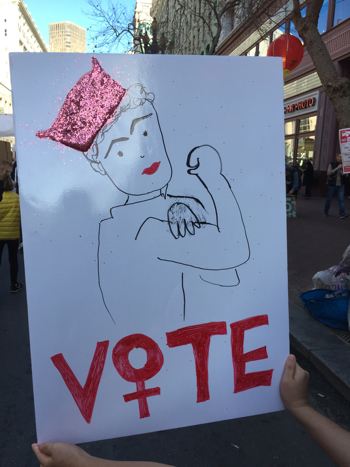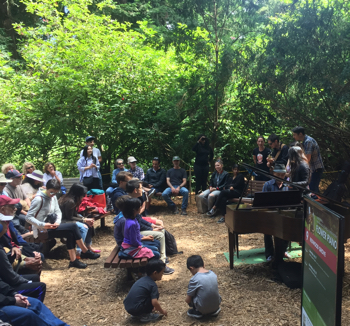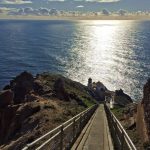News and notes – gender and racial equity, nature experiences, philanthropy
Following an annual tradition, I recently visited Yosemite National Park to absorb the dazzling colors of autumn before the leaves drop, giving way to winter. The grandeur of Yosemite’s beauty always humbles me.
 I am also humbled by the thousands of grassroots activists who rose up over the last two years — marching, raising funds, campaigning — to protect our democracy and our planet. Like many friends and family, I felt most uplifted this week by the many historic wins for a diversity of women in the midterms. How many women won? The Los Angeles Times is keeping track. The next #WomensWave will be on January 19, 2019, when the third annual Women’s March will flood the streets of Washington D.C., and cities throughout the world.
I am also humbled by the thousands of grassroots activists who rose up over the last two years — marching, raising funds, campaigning — to protect our democracy and our planet. Like many friends and family, I felt most uplifted this week by the many historic wins for a diversity of women in the midterms. How many women won? The Los Angeles Times is keeping track. The next #WomensWave will be on January 19, 2019, when the third annual Women’s March will flood the streets of Washington D.C., and cities throughout the world.
I am also reassured by the progress I see every week in the nonprofit community.
For example, my colleagues at Techbridge Girls are working to advance gender and racial equity by bringing science, technology, engineering and math (STEM) education and career exposure to girls attending high poverty schools. With their support, more girls are gaining access to the economic opportunities of STEM careers. A Scientific American profile of Techbridge Girls earlier this year highlights the importance of their work. Among many recent accomplishments, they were the grand prize winners of the UL Innovative Education Award for innovative programming that helps girls develop skills to design solutions that address local and environmental challenges affecting their lives. Girls in the program this year tackled problems like women’s safety, global warming and homelessness, presenting their solutions in a culminating showcase with teachers, funders and other supporters.
 My client San Francisco Botanical Garden recently was awarded a grant from the Institute of Museum and Library Services to embark on a project that will bring more nature experiences to young children through a new “Nature Discovery Zone” in the Garden’s dedicated learning space for children. Among other successes this year, the fourth annual Flower Piano community music festival drew more than 54,000 participants. At a time when many people are losing their connections to the natural world, Flower Piano helps the Garden to further engage youth and families from culturally diverse communities in nature programming. For me and my husband, one of the best parts of the event are the improvisational jam sessions that draw together people of all ages and walks of life to play and sing together in places like the mini amphitheater nestled in the redwood grove. Learn about the Garden’s youth education program, Flower Piano and other programs in the Garden’s 2018 Annual Report.
My client San Francisco Botanical Garden recently was awarded a grant from the Institute of Museum and Library Services to embark on a project that will bring more nature experiences to young children through a new “Nature Discovery Zone” in the Garden’s dedicated learning space for children. Among other successes this year, the fourth annual Flower Piano community music festival drew more than 54,000 participants. At a time when many people are losing their connections to the natural world, Flower Piano helps the Garden to further engage youth and families from culturally diverse communities in nature programming. For me and my husband, one of the best parts of the event are the improvisational jam sessions that draw together people of all ages and walks of life to play and sing together in places like the mini amphitheater nestled in the redwood grove. Learn about the Garden’s youth education program, Flower Piano and other programs in the Garden’s 2018 Annual Report.
More news from the field
Did you catch the recent New York Times travel story about Yosemite National Park? Not your typical travel story, this one walks you through the author’s reflections on the role of fire in the health of a forest, a forest that now exhibits the effects of climate change. The story also references a recent scientific study that found that human-caused climate change is placing a much higher burden on national park areas than the United States as a whole. The UC Berkeley scientists (who are also affiliated with the new Institute for Parks, People, and Biodiversity) analyzed, for the first time, historical and projected temperature and precipitation data across all 417 national parks whose locations in the Arctic, at high elevations and in the arid regions of the southwest make them more vulnerable to a rapidly changing climate.
In Cruisin’ the Fossil Coastline, a new family-friendly exhibition that runs from November 10, 2018 through March 17, 2019, the Oakland Museum of California explores the evolution of California’s landscape, plants, and animals, by presenting the collaborations of an artist and a palaeontologist who traveled up and down the West Coast stopping by fossil dig sites, visiting museums, examining research collections, and meeting with like-minded scientists and artists.
At the September, 2018 Global Climate Action Summit in San Francisco, California, 18 foundations announced that they were stepping up philanthropic support to protect, restore, and expand forests, make land use more sustainable, and secure the rights of indigenous peoples and local communities, who are the best stewards of their lands, territories, and forests.
Here’s why one billionaire philanthropist and conservationist is donating $1 billion to save the planet.
In this month of gratitude, #GivingTuesday is coming up on November 27, 2018. The global day of giving is celebrated on the Tuesday following Thanksgiving and kicks off the charitable season.
On November 30, 2018, the annual Bay Area Corporate Philanthropy Panel at the Foundation Center in San Francisco offers nonprofit leaders and fundraisers an opportunity to learn about local companies that are committed to contributing volunteer time and resources to worthy local nonprofit organizations.
I am an avid OverDrive user for checking out new titles in fiction and nonfiction from local libraries. Through a new offering of the Foundation Center, I am thrilled to now have access to digital books on nonprofit management, communications, proposal writing and fundraising. Thank you Foundation Center!




